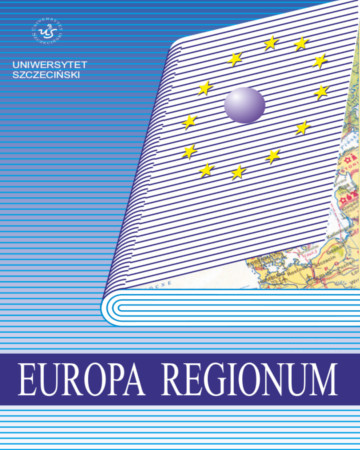
ISSN: 1428-278X
OAI
DOI: 10.18276/er.2017.31-04


Issue archive /
t. 31 2017
Wartość publiczna a działalność przedsiębiorstw
(Public value and business activity)
| Authors: |
Magdalena
Wiśniewska
dr, Uniwersytet Łódzki Wydział Zarządzania Katedra Zarządzania Miastem i Regionem |
| Keywords: | public value shared value public management public value scorecard |
| Data publikacji całości: | 2017 |
| Page range: | 12 (53-64) |
| Klasyfikacja JEL: | H41 M14 |
Abstract
The public value is a relatively new concept and is applied mainly in public
management. Moreover, this concept has become the basis for the emerging new paradigm
of public management. Nevertheless, „public value” is so attractive that it can be introduced
also into the sphere of business activity, as shown in this study. This article introduces the
issue of the impact of private sector on public value. Its purpose is to indicate whether and in
what context one can use the concept of public value in the theory and practice of business
operations. Considerations are based on Polish and world literature.
Download file
Article file
Bibliography
| 1. | Alford, J., Hughes, O. (2008). Public Value Pragmatism as the Next Phase of Public Management. American Review of Public Administration, 2 (38), 130–148. |
| 2. | Bielski, M. (2004). Podstawy teorii organizacji i zarządzania. Wyd. 2 rozsz. Warszawa: Wydawnictwo C.H. Beck. |
| 3. | Blaug, R., Horner, L., Kenyon, A., Lekhi, R. (2006). Public Value and Local Communities. A Literature Review. London: The Work Foundation. |
| 4. | Botterman, M., Millard, J., Horlings, E., van Oranje, C., van Deelen, M., Pedersen, K. (2008). Wartość dla obywateli. Wizja zarządzania publicznego w 2020 roku. Raport Samorządowej Komisji Europejskiej 2020. Rotterdam. |
| 5. | Bozeman, B. (2007). Public Values and Public Interest. Counterbalancing Economic Individualism. Washington, DC: Georgetown University Press. |
| 6. | Coats, D., Passmore, E. (2008). Public Value – The Next Steps in Public Service Reform. London: The Work Foundation. |
| 7. | Cyfert, S., Krzakiewicz, K. (2002). Teoria stakeholders. Krytyka założeń. Prace Naukowe Akademii Ekonomicznej we Wrocławiu, 940, 147–156. |
| 8. | Guston, D.H. (2004). Responsible Innovation in the Commercialised University. W: D.G. Stein (red.), Buying In or Selling Out. The Commercialisation of the American Research University (s. 161–174). New Brunswick: NJ Rutgers University Press. |
| 9. | Hausner, J., Zmyślony, M. (2015). Firma. Idea. Nowe podejście do wartości w biznesie. Sopot, 30 września 2015. Pobrano z: http://www.firmaidea.pl/download/publikacja.pdf (15.04.2016). |
| 10. | Hellström, T. (2003). Systemic Innovation and Risk. Technology Assessment and the Challenge of Responsible Innovation. Technology in Society, 3 (25), 369–384. DOI: 10.1016/S0160-791X(03)00041-1. Pobrano z: https://itunes.apple.com/us/app/ey-pub lic-value-scorecard/id1059827303?mt=8 (15.04.2016). |
| 11. | Jaki, A. (2006). Wycena przedsiębiorstwa. Kraków: Oficyna Ekonomiczna. |
| 12. | Kelly, G., Mulgan, G., Muers, S. (2002). Creating Public Value. An Analytical Framework for Public Service Reform. Discussion paper prepared by the Cabinet Office Strategy Unit, United Kingdom. |
| 13. | Kubiak, E., Nakonieczna-Kisiel, H. (1999). Ekonomia. Makroekonomiczne podstawy polityki gospodarczej. Warszawa: Wydawnictwo Samorządowe FRDL. |
| 14. | Mahdon, M. (2006). Public Value and Health. London: The Work Foundation. |
| 15. | Meynhardt, T. (2012). Public Value – Turning a Conceptual Framework into a Scorecard. Paper submitted for the Conference. Creating Public Value in a Multi-Sector, Shared-Power World, Minneapolis on September 20–22. |
| 16. | Meynhardt, T., Gomez, P., Schweizer, M. (2014). The Public Value Scorecard: what makes an organization valuable to society? Performance, 1 (6), 2–9. |
| 17. | Moore, M. (1995). Creating public value. Cambridge: Harvard University Press. |
| 18. | Moore, M. (2003). The Public Value Scorecard. A Rejoinder and an Alternative to ‘Strategic Performance Measurement and Management in Non-Profit Organizations’ by Robert Kaplan. Working Paper #18, Hauser Center for Nonprofit Organizations, Kennedy School of Government, Harvard University, Boston. |
| 19. | O’Flynn, J., Alford, J. (2009). Making sense of public value: concepts, critiques and emergent meanings. International Journal of Public Administration, 3–4 (32), 171–191. |
| 20. | Owen, R., Goldberg, N. (2010). Responsible Innovation. A Pilot Study with the UK Engineering and Physical Sciences Research Council. Risk Analysis, 11 (30), 1699–1707. DOI: 10.1111/j.1539-6924.2010.01517.x. |
| 21. | Porter, M.E., Kramer, M.R. (2011). Creating Shared Value. Harvard Business Review, Jan–Feb, 63–70. |
| 22. | Samuelson, P.A., Nordhaus, W.D. (1995). Ekonomia. Warszawa: Wydawnictwo Naukowe PWN. |
| 23. | Stoker, G. (2006). Public Value Management. A New Narrative for Networked Governance? The American Review of Public Administration, 1 (36), 41–57. |
| 24. | Talbot, C. (2011). Paradoxes and Prospects of ‘Public Value’. Public Money and Management, 1 (31), 27–34. |
| 25. | Van den Hoven, J. (2013). Options for Strengthening Responsible Research and Innovation. Report of the Expert Group on the State of Art in Europe on Responsible Research and Innovation. Brussels: European Commission. |
| 26. | Von Schomberg, R. (2011). Towards Responsible Research and Innovation in the Information and Communication Technologies and Security Technologies Fields. Brussels: European Commission. |
| 27. | Wiśniewska, M., Stawasz, D. (2016). Critical analysis of the possibility of application of participatory methods in local development management in Poland. W: Project Management Development – Practice and Perspectives, Conference Proceedings (s. 398–408). Riga. |
| 28. | Woodruff, R. (1997). Customer value: The next source for competitive advantage. Journal of the Academy of Marketing Science, 2 (25), 139–153. |